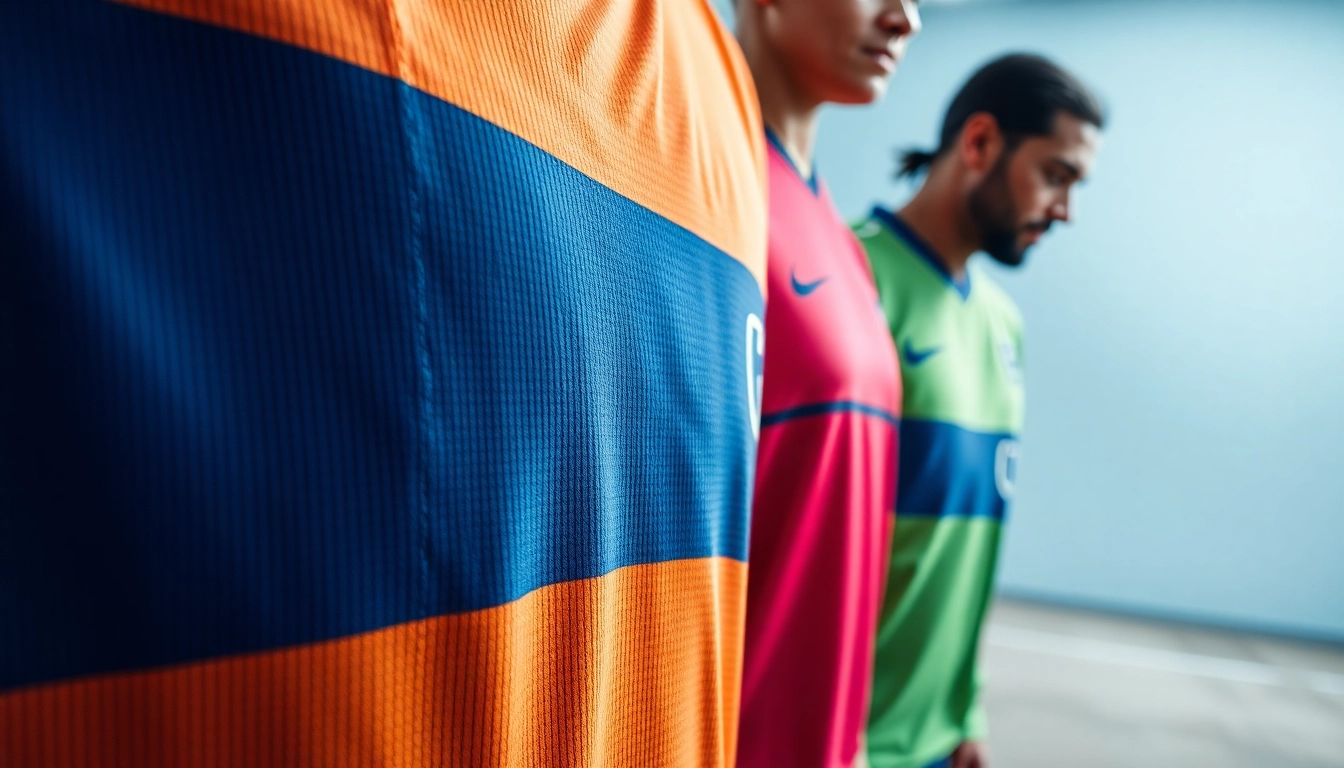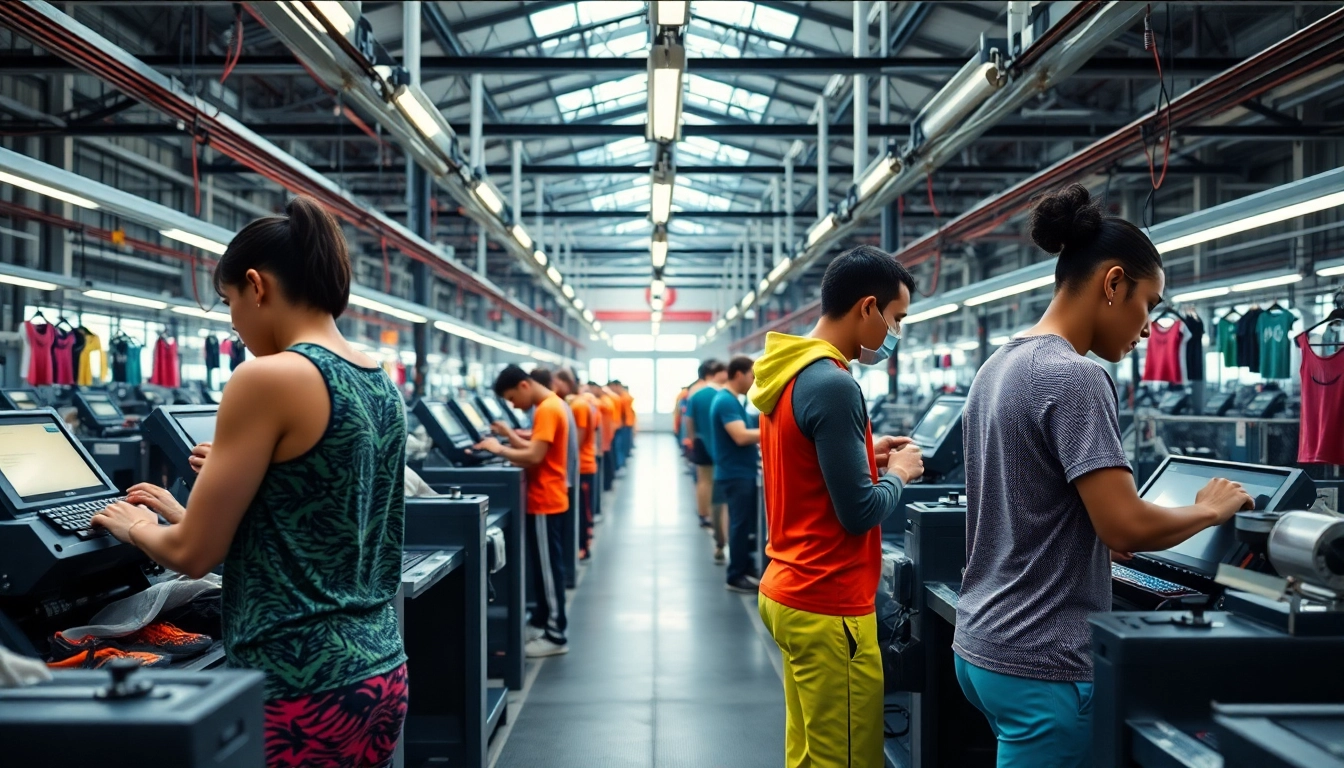Understanding the Role of Sportswear Manufacturers in the Athletic Industry
In the competitive world of sports and activewear, the role of sportswear manufacturers cannot be overstated. They are the backbone of the athletic apparel supply chain, transforming innovative designs into tangible products that meet athletes’ demands worldwide. From elite professional sports teams to local fitness enthusiasts, sportswear manufacturers provide essential apparel that combines performance, durability, and style. With the dynamic landscape of sports technology and consumer preferences, these manufacturers continuously evolve, integrating the latest innovations to stay ahead in the market. For brands looking to partner with a reliable sportswear manufacturer, understanding the manufacturing process, quality benchmarks, and technological trends is fundamental to achieving success.
Overview of Sportswear Manufacturing Processes
The manufacturing of sportswear involves a multi-phase process that requires precision, innovation, and adherence to quality standards. It begins with extensive research into fabrics and technical textiles, followed by design and prototyping. Once the designs are finalized, raw materials—often specialized fabrics such as moisture-wicking, breathable, or stretchable textiles—are sourced from trusted suppliers.
The actual production process encompasses cutting, sewing, printing, sublimation, and finishing. Advanced machinery, such as automated cutting tables and sublimation printers, ensures precision and efficiency. For example, sublimation printing allows for vibrant, long-lasting designs that can withstand rigorous washing cycles, which is vital for high-performance sportswear.
Throughout these stages, strict quality control measures are implemented. These include fabric testing for durability and performance, as well as inspection at various checkpoints during manufacturing. Manufacturers like Sportswear Manufacturers prioritize seamless integration of design and production to deliver consistent quality and innovative features to clients.
Impact of Innovation and Quality on Brand Reputation
In the sports apparel industry, brand reputation hinges significantly on the quality and innovation embedded in products. Companies investing in cutting-edge materials and manufacturing techniques establish themselves as leaders. For instance, incorporating moisture-wicking fabrics or compression technology boosts athlete performance and enhances brand credibility.
High-quality manufacturing reduces product failures, complaints, and returns, fostering customer loyalty. Conversely, brands associated with substandard products risk damage to their reputation, leading to decreased market share. Leading manufacturers incorporate rigorous testing protocols and sustainable practices to align with consumer values and environmental standards, thereby strengthening brand integrity.
Top-tier sportswear manufacturers also innovate through technology integration—such as smart textiles and wearable tech—that adds value and differentiation in a saturated market. The impact of consistent quality and innovation results in positive reviews, increased sales, and long-term brand equity.
Key Features of Top Sportswear Manufacturers
Excellence in sportswear manufacturing requires a blend of several critical features:
- Advanced Technical Capabilities: Utilization of the latest machinery, like computerized sewing and sublimation printing, enhances precision and flexibility.
- Customization Expertise: Ability to produce tailored designs, logos, and fittings to meet client specifications.
- Material Sourcing and R&D: Access to high-performance fabrics and continuous product innovation through dedicated research teams.
- Quality Assurance: Implementation of ISO standards, durability testing, and inspection protocols to ensure consistency.
- Scalability and Reliability: Capacity to handle both small custom orders and large volume productions without compromising on quality or timelines.
- Sustainable Practices: Adoption of eco-friendly materials and ethical manufacturing processes aligned with global sustainability trends.
For example, manufacturers in Pakistan, like Extreme Sportswear, exemplify these features, offering customization, high-quality textiles, and reliable production cycles tailored for international markets.
Choosing the Right Sportswear Manufacturer for Your Brand
Factors to Consider: Customization, Pricing, and Lead Times
Selecting a suitable sportswear manufacturer involves evaluating several critical factors. First, customization capabilities are essential; a manufacturer must be able to deliver designs that align with your brand identity and performance standards. This includes logo embroidery, fabric choices, and fit specifications.
Pricing is equally important. While a lower cost might be attractive initially, it shouldn’t compromise quality or lead times. A transparent pricing structure with clear unit costs, minimum order quantities, and potential discounts for bulk orders ensures better budget management.
Lead times are vital, especially for seasonal launches or event-specific apparel. Reliable manufacturers provide realistic timelines and have contingency plans to handle unforeseen delays, ensuring your products reach the market on schedule.
Evaluating Fabric Quality and Technical Specifications
Fabric quality directly impacts the performance, durability, and comfort of sportswear. Top manufacturers source high-performance textiles such as polyester blends with moisture-wicking and breathability features or Lycra for elasticity. Understanding technical specifications, such as fabric weight, stretch recovery, and breathability ratings, helps in selecting suitable materials.
Requesting fabric samples and technical datasheets enables brands to assess tactile and functional qualities in advance. Quality certifications like OEKO-TEX or Global Organic Textile Standard (GOTS) further ensure your apparel meets safety and environmental standards.
Assessing Experience and Client Portfolio
Experience matters immensely when selecting a sportswear manufacturer. Established companies with years of industry presence demonstrate stability, technical competence, and an understanding of global markets. Reviewing their client portfolio and case studies reveals their expertise in producing specific types of sportswear, such as team uniforms, performance training gear, or compression wear.
For example, Pakistan’s prominent manufacturers such as DiezrSports or Rijiz have extensive experience in various sports categories, showcasing their adaptability and commitment to quality.
Trends and Technologies Shaping Modern Sportswear Manufacturing
Use of Sustainable and Eco-Friendly Materials
As environmental consciousness rises, sportswear manufacturers are increasingly adopting sustainable practices. Organic cotton, recycled polyester, and biodegradable textiles are now standard options for eco-aware brands. Sustainable manufacturing not only reduces carbon footprint but also appeals to a growing demographic of environmentally conscious consumers.
Leading manufacturers in Pakistan, such as Extreme Sportswear, prioritize eco-friendly materials and implement environmentally responsible processes in fabric sourcing, dyeing, and waste management.
Advancements in Printing, Sublimation, and Manufacturing Tech
Technological innovations in printing and sublimation have revolutionized sportswear design. High-definition sublimation allows for complex, vibrant patterns without affecting fabric flexibility or breathability, enabling brands to produce visually striking and durable apparel.
Automation in cutting and sewing reduces errors, speeds up production, and maintains consistency. 3D modeling and virtual prototyping minimize material waste and streamline the development process.
Incorporating Performance-Enhancing Features
Modern sportswear now integrates features such as compression zones, antibacterial fabrics, UV protection, and smart textiles. These enhancements elevate athlete performance and recovery while providing an added competitive edge.
Manufacturers leveraging these features, like Extreme Sportswear, attract premium clients seeking innovative solutions that combine technology with aesthetics.
Steps to Partner with a Reliable Sportswear Manufacturer in Pakistan
Research and Shortlisting Potential Partners
The first step involves comprehensive market research. Exploring online directories, industry expos, and trade shows helps identify reputable manufacturers. Key considerations include their product range, technological capabilities, certifications, and reputation within the industry. Shortlisting involves evaluating their experience in producing similar sportswear lines and assessing client reviews.
Samples, Production Runs, and Quality Assurance
Before committing to mass production, requesting samples allows for evaluating fabric quality, stitching, and overall fit. Conducting a small production run tests the manufacturer’s ability to meet specifications and deadlines. Implementing quality assurance processes, including third-party inspections and on-site audits, ensures product consistency and adherence to standards.
Finalizing Contracts and Launching Your Line
Clear contractual agreements outlining order quantities, delivery timelines, quality standards, and payment terms are essential. Establishing communication channels and review periods fosters transparency. Once final agreements are in place, brands can proceed with production, branding, and market launch strategies confidently.
Measuring Success: How to Track Performance and Growth
Customer Feedback and Brand Recognition
Customer reviews, repeat orders, and brand visibility serve as indicators of product acceptance. Monitoring social media engagement and direct feedback helps refine future offerings. Consistent quality and innovation boost brand loyalty and recognition in competitive markets.
Sales Metrics and Market Penetration
Analyzing sales data, growth rates, and geographic expansion indicates commercial success. Tracking conversion rates and retail partnerships aid in fine-tuning distribution strategies. A data-driven approach ensures continuous alignment with market demand.
Continuous Improvement and Future Collaboration Opportunities
Ongoing collaboration with manufacturing partners facilitates innovations, cost reductions, and diversified product lines. Regular evaluation of manufacturing processes and market trends allows brands to stay ahead in the evolving sportswear landscape.



